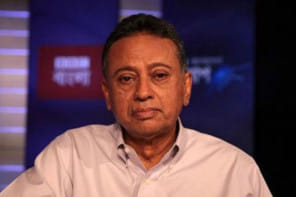Rohingya crisis to take a toll on economy: Sanem
The influx of Rohingya refugees has created a pressure for the economy and overall security of Bangladesh, said the South Asian Network on Economic Modeling (Sanem) yesterday.
Bangladesh's future development hinges on some critical projects in Chittagong and the hill tracts areas, such as the Chittagong port, special economic zones and deep sea ports, which are very close to Myanmar, said the private think-tank.
“A possible conflict with Myanmar can hamper Bangladesh's efforts for integration with Southeast Asian countries,” the Sanem said in its latest quarterly economic review.
There is also a risk of a rise in military expenditure in Bangladesh, which can have implications on the development activities.
Subsequently, it called for prudent diplomatic strategies and proper management of refugees, aid and security issues to deal with the Rohingya crisis. Selim Raihan, executive director of the Sanem, presented the review at a programme held at The Westin Dhaka.
The review also touched upon the recent increase in rice price, jobless economic growth and the Sustainable Development Goals. There has been a 44 percent rise in the price of coarse rice in recent days from a year ago.
“In order to contain the soaring price of rice, there is a need to increase the supply of rice in the local market,” the Sanem said, adding that the attempts to import the staple from India, Cambodia and Myanmar should be intensified.
The Sanem said the price of rice should be set at Tk 20 a kg at the open market sale.
“There should also be careful actions against hoarding so that such actions don't disrupt the supply chain.”
The organisation said Bangladesh is at the risk of jobless growth phenomenon.
Between 2013 and 2016, the share of industry and manufacturing in employment declined for the first time in Bangladesh.
Job creation was negative in agriculture and very small in manufacturing, while there was a large employment generation in the service sector.
To counter this, there is a need for economic diversification and promotion of labour-intensive and highly productive sectors, the think-tank said.
The review also touched upon the SDGs.
A recent study by the Sanem for the Planning Commission shows that additional resources needed to implement the SDGs in Bangladesh will amount to 10 percent of the country's gross domestic product in 2017 and it can go up to 24 percent by 2030.
“Given the changing global scenario, Bangladesh will have to rely more on domestic sources to finance the SDGs, and this is, no doubt, a big challenge.”
It is also important to note that the mere generation of resources would not ensure the implementation of the SDGs if institutional and governance related aspects are not properly addressed.
“Efforts need to be something extraordinary and a strong political commitment is needed to implement the SDGs.”

 For all latest news, follow The Daily Star's Google News channel.
For all latest news, follow The Daily Star's Google News channel. 



Comments